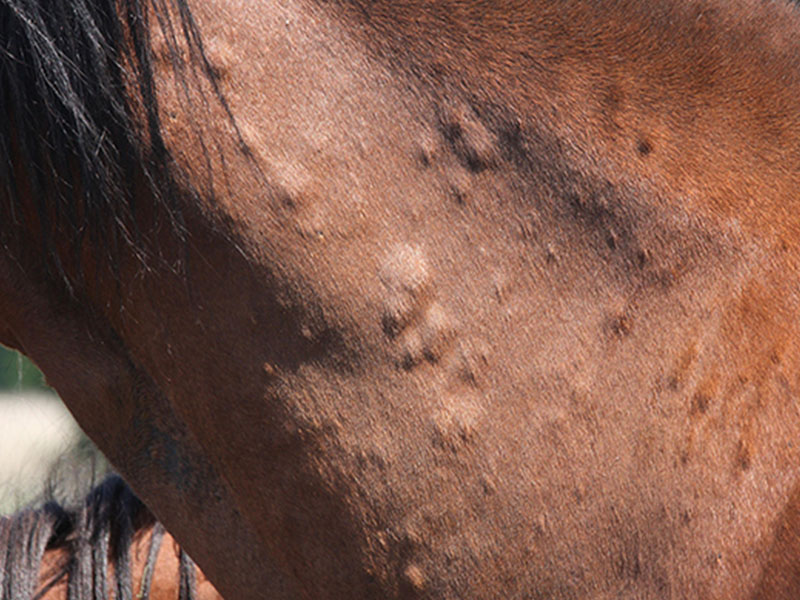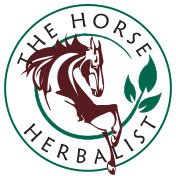
How to help Horses with Hives
If you’ve noticed your horse or other horses in the stables or paddocks suddenly breaking out in hives, you’re not alone. An unusually high number of horses are developing these raised welts on their skin. While hives in horses aren’t unusual, the spike in cases recently has many horse owners concerned. This article will delve into the causes, treatment options, and preventative measures for hives in horses.
What Are Hives in Horses?
Hives, or “urticaria,” are an immune response that results in raised, swollen, and sometimes itchy patches on the skin. In horses, these can vary in size from tiny bumps to larger patches that cover significant areas of the body. Hives can appear anywhere on the body, including areas covered by tack, and they may come and go or linger longer than usual.
Symptoms of Hives in Horses
Hives are generally easy to identify. Here are some signs to look for:
- Raised, soft bumps on the skin, ranging from a few millimetres to several centimetres.
- Itchy patches that cause the horse to rub against surfaces.
- Patches that may increase in size, spread, or merge over time.
- Occasional sensitivity to touch in affected areas.
Treating Hives in Horses
While hives may resolve on their own, treatment is often necessary to alleviate discomfort. Here are some traditional approaches:
- Cool Baths: A cold water rinse can help soothe the skin and reduce itching. Aloe juice cab be added to the water to provide additional relief.
- Fly Repellents: If insects are the culprit, using a natural fly repellent can reduce bites that might be causing hives.
- Homeopathics: The Horse Herbalist has two specially formulated homeopathic preparations of pilules Aptly named ‘Bities’ for reaction stemming from mosquito and other biting insects, and ‘Itchies/Hives’ for lumps and welts particularly. Lumps and welts will rapidly reduce using the above combinations.
- Colloidal Silver: Dose internally 30-40ml twice a day. Use colloidal silver topically on the lumps and welts.
- Identify and Remove Triggers: If possible, try to identify any new additions to your horse’s diet, environment, or routines that could be triggering the reaction. Removing potential allergens can help resolve hives more quickly.
- Supplemental Support: If your horse is prone to skin reactions or has a chronic skin condition then the liver and the gut will be needing some support before a lasting result can be obtained. Our products Anti-allergen formula, Liver and Spleen Spring Clean and Immune Boost may be appropriate.
Common Causes of Hives in Horses
Understanding why so many horses are experiencing hives right now involves looking at environmental and seasonal factors. Here are some of the main culprits:
- Allergens in the Environment: Seasonal changes can bring new pollen, mould spores, and insect bites. Horses can be sensitive to pollen from plants, trees, grasses or airborne allergens carried in the wind. Additionally, as temperatures drop or humidity rises, mould and mildew in stables and fields can increase, exacerbating allergic reactions.
- Insects: Insect bites are a common cause of hives or itch. Mosquitos are the common culprits, midges, gnats, and other biting flies are active, particularly in certain areas. Some horses are hypersensitive to insect bites and can develop large, itchy welts from them.
- Medications or Supplements: If you’ve recently added new supplements, vitamins, or medications, these could trigger an allergic reaction. Antibiotics, worm pastes, and vaccinations are common medications that may cause hives as a side effect.
- Stress or Exercise: Occasionally, physical exertion or stress can be a contributing factor to hives. Competition season or a new training regimen can bring on physical stress, which may prompt an immune response in some horses.
Preventative Measures
To reduce the risk of hives recurring, consider the following:
- Manage the Environment: Regularly clean and ventilate stables to keep dust and mould to a minimum. Clean and rotate pasture areas, as certain plants may trigger allergies.
- Monitor Diet: Slowly introduce new feed or supplements, and keep a close eye on ingredients that have been known to cause reactions in some horses.
- Seasonal Adjustments: Adjusting fly and insect control measures for seasonal changes can also help prevent hives.
- Avoid Known Allergens: If your horse has a history of hives during certain times of the year, try to identify specific allergens and take measures to avoid them when possible.
When to Call the Vet:
If your horse is showing signs of distress, it’s best to consult your vet. Severe cases might involve complications like anaphylaxis, which requires immediate veterinary care.
